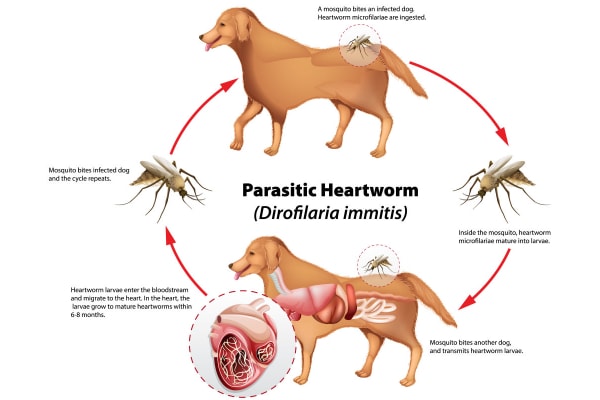If you are asking yourself, “Do senior dogs need heartworm medication?” reading this article could save your dog’s life. Senior dog expert and integrative veterinarian Dr. Julie Buzby explains why the answer to this question is a resounding, “Yes! Yes! One million times, yes!”

Every summer, I enjoy evenings on the deck with some of my good friends. We all love getting together and look forward to it every year.
However, there is always one downfall—mosquitoes! No matter how much repellent I use, I always get bitten when sitting outside, especially at sunset.
As we were swatting away mosquitoes and looking over at our dogs peacefully snoozing, my friend said to me, “Why can’t we be as lucky as our dogs? Mosquitoes don’t bite them!”
If only that were true…
The ensuing conversation about how mosquitoes do in fact bite dogs and can carry deadly heartworms was what put writing this article on my radar. There was no doubt that my friend dearly loved her older dog. But unfortunately, she was making a grave mistake.
She had heard of heartworms and used to give her senior dog heartworm preventative. But she had stopped using it once her dog became a senior because she thought that heartworms were something that mostly affected young dogs. And she had no idea the mosquitoes that were biting that night could transmit heartworms to her dog.
How do dogs get heartworms?
As I discussed with my friend, infective mosquitoes are responsible for spreading heartworms from one dog to another. When a mosquito feeds on an infected dog, it ingests microfilaria (i.e. baby heartworms) that are circulating in that dog’s blood. These microfilariae develop into larvae in the mosquito. Then, when the mosquito bites another dog, it deposits the heartworm larvae into that dog’s body.
Over a period of about six months, these immature heartworms develop into 10 to 12-inch-long adult heartworms. The adults live in the dog’s blood vessels in the lungs and, if present in high enough numbers, also in the chambers of the heart.

To complete the life cycle, the adult worms release microfilaria into the dog’s bloodstream. These microfilariae can then get picked up by the next mosquito that bites that dog and transmitted to another unsuspecting host.
Why are heartworms dangerous for dogs?
Under normal conditions, adult heartworms can live in a dog for five to seven years. This long lifespan means that an infected dog can potentially contribute to the spread of heartworms to many other dogs in that time period. But more importantly, it also means that the worms can wreak havoc on the dog’s heart and lungs for years.
While the average number of adult heartworms a dog has is 15, it is possible for dogs to have several hundred heartworms. These spaghetti-like worms can cause a lot of physical damage, not to mention taking up valuable real estate in the heart and lungs. This can compromise heart function over time.
Early on, an infected dog may be asymptomatic. Or he or she may have more mild signs of heartworms in dogs like:
- Persistent cough
- Weight loss
- Poor appetite
- Being a lethargic dog
But as heartworm disease in dogs progresses, the dog may eventually develop right-sided heart failure. Or, having a high number of worms can cause a rapidly life-threatening condition called caval syndrome, which occurs when worms block blood flow in the heart. Signs of advanced heartworm disease include:
- Difficulty breathing
- Anemia in dogs
- A pot-bellied dog appearance from fluid accumulation in the abdomen (i.e. ascites)
- Collapse
And if the dog is a senior dog who already has a heart murmur in dogs, enlarged heart, or other types of heart disease in dogs, a heartworm infestation can be all the more serious.
Do senior dogs need heartworm medication?
This leads us to the discussion I was having with my friend. Does a senior dog need heartworm prevention?
My answer is “YES!” Let me say it again…Your senior dog does indeed need heartworm medication!

Our beloved older dogs are at increased risk for significant disease as compared to when they were in their “teenage years.” Unfortunately, older dogs tend to have weaker immune systems. Also, they are more likely to have other compounding diseases like diabetes, heart failure, or cancer. Having one of these other diseases would make fighting a heartworm infection that much harder.
Additionally, the mosquitoes that carry heartworms are found in all 50 states (and many other countries). Even if your dog only goes outside long enough to go to the bathroom, he or she is still at risk of getting bit by a mosquito during that time. And mosquitoes can easily come inside your house and bite your dog there too.
All in all, this means that there is a chance for any dog—no matter if he or she is big or small, young or old, indoor or outdoor—to receive a mosquito bite and contract heartworm disease. This means that all dogs need heartworm prevention.
Do senior dogs need heartworm medication in winter too?
Ok, so we have established that older dogs definitely do need heartworm medication. But do they need it all the time?
A common misconception about heartworm prevention is that you only need to give it to your dog during the warmer months. However, the belief that dogs don’t need heartworm medication in the winter has several major flaws:
- Heartworms live all 12 months of the year inside infected dogs, cats, wolves, coyotes, and other hosts.
- Mosquitoes are becoming more resistant to the cold, and some are able to overwinter as adults. Plus, climate change and the heat generated by urban environments can allow larvae to develop in infected mosquitoes for a higher percentage of the year.
- Most heartworm preventatives work retroactively (i.e. kill larvae the dog has acquired over the past months). And they are most effective against the larva within the first 30 (or so) days of the dog becoming infected. As the worms mature, it is more difficult to kill them with heartworm prevention medications.

A real-life example of the importance of year-round heartworm prevention
This last bullet point above is best explained with an illustration. Imagine you are camping over Labor Day in September. Naturally, you wanted to share this experience with your beloved dog, so you brought him or her along. However, on this mini-vacation, your poor dog gets bitten by a mosquito. And this mosquito happens to be carrying heartworm larvae.
The weekend ends and you go home, having no idea that your dog is now infected with heartworms. Winter is coming up, so you don’t give your dog his or her monthly heartworm prevention.
With no anti-parasitic medication to kill it, the heartworm larvae can begin to develop over the next six or so months. And by the time you start giving the heartworm preventative again in the spring, the existing heartworms will be far more resistant to the effects of the drug. This can spell big trouble for your dog.
What is the best way to protect your senior dog from heartworms?
So, how do we avoid the scenario that I just described? The answer lies in year-round heartworm prevention and yearly heartworm tests. This concept is the basis for the American Heartworm Society’s “Think 12” campaign.
Step 1: Administer heartworm prevention year-round
There are many different brands of heartworm-preventative medication on the market. This should make it easy to find something that fits your dog’s needs (and yours too).
Most heartworm prevention medications are a chewable tablet that is given once a month every month. But for dogs who don’t do well with oral options, there are also a few heartworm preventatives that are a liquid you can apply to the skin monthly.
Nowadays, there are even combination preventatives that will prevent heartworms, fleas/ticks, and intestinal parasites. However, not every heartworm medication will protect against all these parasites. This makes it important to work with your veterinarian to find a product that meets your dog’s parasite-preventative needs.
Some vets also carry injectable heartworm prevention that lasts a year (ProHeart®12) or six months (Proheart®6). ProHeart is different from many of the other heartworm preventatives, which consist of a short-acting dose of anti-parasitic medication. Instead, with ProHeart, the medication is contained in special microspheres that stay in your dog’s fatty tissue and slowly release the drug over 6 or 12 months.
If it is challenging to remember to give your dog a heartworm preventative each month, or your dog is difficult to medicate, ProHeart can make it easy to keep your dog protected year-round.
Step 2: Test your dog for heartworms once a year
The other important aspect of protecting your older dog from heartworm disease is having your vet perform a yearly heartworm test. The most common heartworm test is a blood test that looks for the presence of adult female worms. However, there are situations where the vet may want to also run a microfilaria test (i.e. a test that looks for “baby heartworms” in the bloodstream).

Remember that it takes about six months for larvae to develop into adults, which then produce microfilaria. This means that neither heartworm test can tell you if the dog has an immature heartworm infection. For this reason, the test could “miss” an early infection the first time and then pick it up at the next test.
This makes yearly testing (or in certain situations, retesting a “negative” dog in six months) important. The sooner you find out that a dog is heartworm positive, the sooner you can start treatment. And the less time the worms will have to damage the heart and lungs.
The importance of testing before starting a preventative
If your dog is not on a heartworm preventative year-round or has never been on prevention and is over six to seven months old, you should have him or her tested for heartworms prior to starting the preventative. This serves two main purposes.
First, as discussed, a heartworm test can help detect the infection promptly so your dog can begin heartworm treatment. Secondly, it makes it safer to give your dog the heartworm preventative. This is the case because while some heartworm prevention medications are used as part of the treatment protocol for heartworm-positive dogs, giving prevention to a heartworm-positive dog with a high number of circulating microfilaria occasionally can cause an anaphylactic allergic reaction.
The importance of yearly testing even if your dog is on a heartworm preventative year-round
If your dog is on year-round heartworm prevention, you may wonder why your vet is also suggesting a yearly heartworm test. Well, there are a few reasons.
First, while heartworm preventative medications are highly effective, nothing is ever going to be 100% effective. Secondly, forgetting or being late with just one dose of heartworm preventative can sometimes provide enough time for heartworm infection to take hold. Finally, some dogs may spit out, rub off, or vomit up their heartworm preventative without you realizing it. This also creates an unprotected window of time where your dog could contract heartworms.
Continuing yearly testing allows you to find out promptly if your dog became infected with heartworms as a result of any of these scenarios.

What happens if my senior dog tests positive for heartworms?
In the event that your senior dog has a positive heartworm test, the vet will typically start by confirming those results with a microfilaria test and/or a second heartworm test. Plus, he or she will assess your dog to determine the severity of the infection. This may involve a thorough physical exam, chest X-rays, or other specialized testing (e.g. echocardiogram).
After your veterinarian knows the extent of your dog’s heartworm disease, he or she will devise a treatment plan. Typically, this involves using multiple medications over the course of several months. Heartworm preventatives are typically part of the protocol, but killing adult worms usually involves several doses of a more powerful injectable anti-parasitic drug called melarsomine.
Heartworm treatment can be dangerous and difficult, especially for older dogs. The dying worms can cause significant inflammation and pulmonary thromboembolisms (i.e. clots in the lungs). Plus, the melarsomine injections can be painful and the dog must be on strict rest for months. However, since heartworms can be life-threatening, treatment is typically still the best course of action.
It is also worth mentioning that treatment for heartworm disease is expensive. It often costs far more to treat heartworm disease than it does to prevent it.
For all of these reasons—the danger heartworms pose to dogs, the challenges of treatment, and the expense of treatment—prevention is the best medicine when it comes to heartworm disease. So without a doubt, your senior dog does need heartworm medication year-round and yearly heartworm testing.
Talk to your veterinarian about heartworm prevention
If your senior dog isn’t currently taking a heartworm preventative, there is no time to waste. Make an appointment with your veterinarian to have your dog heartworm tested. And work with your vet to find the best heartworm prevention for your older dog. Your dog’s life could very well depend on it.
Is your senior dog taking heartworm medication?
Please comment below.


I gave my dog simparico trio, he started having neurological problems after. Is there anything safer as I do not want to EVER give this to him again.
Hi Heather,
I am sorry your pup experienced these worrisome side effects. There are MANY different heartworm prevention products available (topical, oral, and injectable). It may take some time to find one that is a good fit for your boy. It would be best to go over the options with your vet and let them help guide you in the selection process. Hoping your pup is feeling better and praying for smooth sailing ahead.
Hi. I am fostering a very active 12-year-old senior dog from a city shelter. I took him to the veterinary center they send dogs to that need HW treatment. He came into the shelter in August and today is the first day he was seen at the vet center. I was told today that due to his age that they will not do the fast kill. All I can do for him is give him the monthly preventative or go to a private vet where he can be monitored more closely and have x-rays done, which the city will not foot the bill for. I’m worried that won’t be enough. He does occasionally cough and hack.
Your thoughts? Thank you.
Hi Senior dog lover,
Thank you for being willing to take in this sweet old man. I understand your concern but agree with the advice given by the vet center. While the “fast kill” method is preferred, some dogs are just not good candidates for this treatment, and it could cause more harm than good. In order to assess this boy more thoroughly and make sure the fast kill is safe, some in-depth testing would need to be performed and he would have to be monitored closely. While the “slow kill” method is not ideal, it does work and can be a better choice for some dogs. Hoping you can find the answers you need to make a choice with which you can feel confident. Bless you and your senior boy.
is there a natural heartworm preventive? my dog tends to feel sick after she takes hers and I have tried several. how do you feel about nosodes?
Hi Sheri,
This is such a great topic for discussion! Thank you for bringing it up. Unfortunately, there is no natural heartworm preventative that is effective. Nosodes are interesting. They are supposed to work similarly to a vaccine. The idea with vaccination is to expose your immune system to a bacteria or virus in a form that does not cause disease but will allow your body to develop a “memory” of the pathogen. This way if you ever come into contact with the actual bacteria or virus, your body will recognize it and fight it off to prevent disease. Nosodes are bits and pieces of bacteria or virus infected tissue that are taken to try and expose your immune system to the pathogen to form this same memory. So, they probably do work to some degree. Studies have shown that they are not as effective as vaccines but do provide some protection. The problem with trying to use nosodes as heartworm prevention is heartworms are a parasite, not a bacteria or virus. If your dog does not tolerate her prevention well, please make sure your vet is aware. You can compile a list of all the products you have tried, and your vet can compare the active ingredients. There may be a common ingredient that your pup just cannot handle. I hope this will offer some insight and guidance on how to proceed. Best wishes to you and yours!